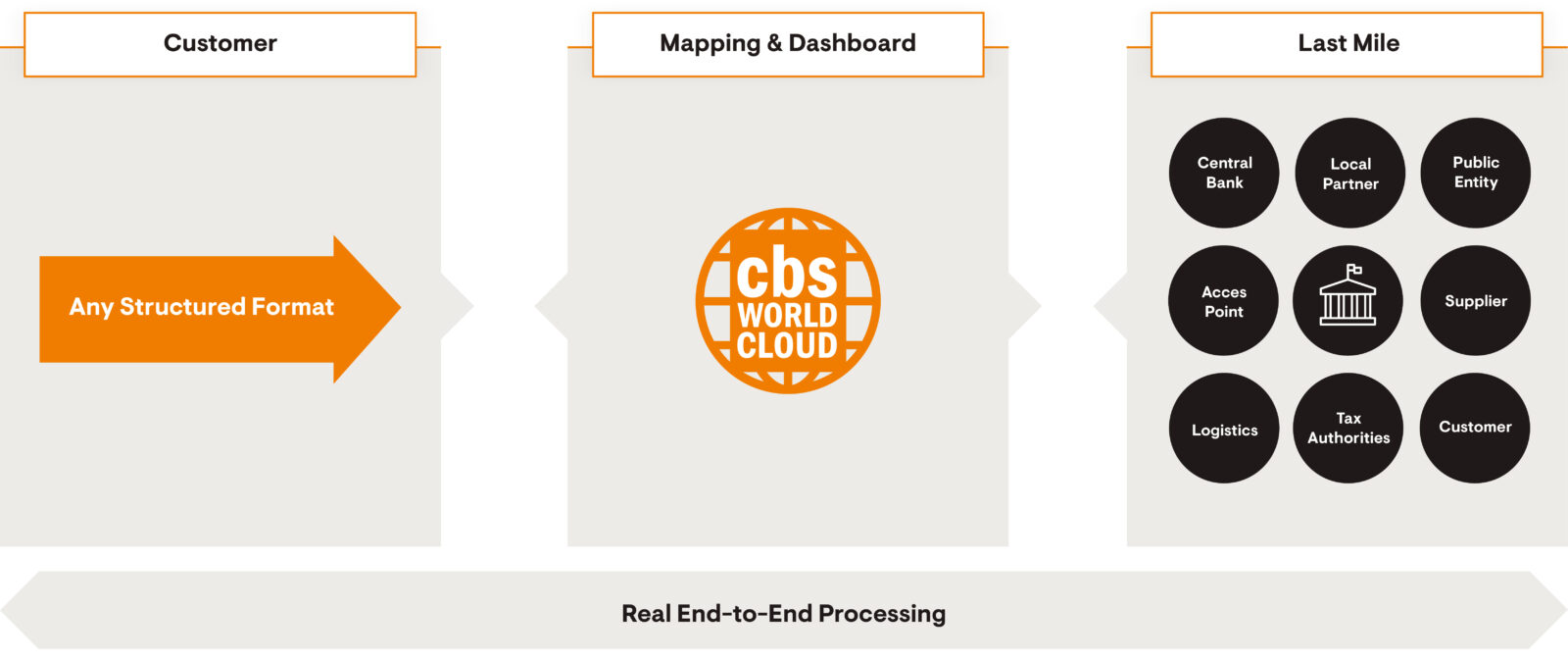We offer a unique all-in-one carefree package running and supporting your digital end-to-end processes.
cbs Managed EDI
(SAP & Non-SAP)
Boosting your complex integration landscape on a secure and high-available solution to efficiently reduce efforts, risks and costs
Future Ready
cbs Managed EDI is the next step in digital process evolution and enables customers to efficiently outsource their integration landscape.
Over 15 million processed messages. >800 Customer entities and data centers. 99,9 % availability. Over 30 countries covered across Latin America, Europe and Asia. All relevant legal requirements and business networks covered. ISO 27001 certified data center. Highly rated customer satisfaction.
In the ever-evolving landscape of modern business, Electronic Data Interchange (EDI) has become an integral part of facilitating seamless and efficient communication between trading partners. As organizations strive to enhance their operational efficiency and maintain compliance with industry standards, the adoption of Managed EDI services has gained prominence. However, this journey is not without its complexities, encompassing both legal considerations and common challenges that businesses must navigate.
Legal Considerations in EDI
EDI (Electronic Data Interchange) involves the exchange of sensitive business information, necessitating a robust framework for data security and privacy. Organizations need to adhere to various data protection regulations such as GDPR, HIPAA, or industry-specific compliance standards to safeguard customer and partner data.
Establishing clear contractual agreements between trading partners and managed service providers is critical. These agreements should define roles and responsibilities, service level agreements (SLAs), and outline the terms for data ownership, usage, and retention, ensuring a transparent and legally sound partnership.
Various industries are subject to specific regulatory requirements governing data exchange. EDI (Electronic Data Interchange) services must align with these regulations to avoid legal repercussions. Staying informed about changes in compliance standards and adapting systems accordingly is vital.
The exchange of electronic documents may involve intellectual property considerations. Businesses must address issues related to copyrights, trademarks, and patents to prevent disputes over ownership and usage of proprietary information.
Challenges in EDI
Integrating EDI into existing business systems can be a complex process. Managing diverse data formats, communication protocols, and ensuring seamless connectivity between trading partners poses a significant challenge.
Different trading partners may use varied data formats and standards. Efficient data mapping and translation are crucial to ensuring that information is accurately interpreted and processed, reducing the risk of errors and miscommunication.
As businesses grow, the scalability of the EDI infrastructure becomes crucial. EDI services should be flexible enough to accommodate changes in trading partner networks, transaction volumes, and evolving business requirements.
Timely identification and resolution of issues are paramount in EDI operations. Managed service providers must have robust monitoring systems and proactive support mechanisms in place to address potential disruptions promptly.
In conclusion, as businesses increasingly rely on Managed EDI for streamlined operations, navigating the legal landscape and addressing inherent challenges are pivotal for a successful implementation. By staying abreast of legal requirements, fostering transparent partnerships, and proactively tackling operational hurdles, organizations can harness the full potential of Managed EDI to drive efficiency and collaboration in their supply chain processes.
There is no digitalization without a resilient and secure integration management.
Architecture – EDI based solution

FORMATS
We realize reliable any to any (any platform, any format, any network, any custom specifics …) communication in regulated and non-regulated communication flows.
And many more…
FEATURES
We support a wide range of commonly known features and options to leverage state-of-the-art integration services.
Cloud-Based Solution
Customers are increasingly interested in cloud-based EDI solutions for scalability, flexibility, and ease of maintenance.
Integration with ERP System
Seamless integration with Enterprise Resource Planning (ERP) systems is crucial for efficient data flow and business process automation. SAP and non-SAP
Real-Time Visibility
Enhanced real-time monitoring and visibility into the status of EDI transactions, enabling quick identification and resolution of issues.
Mobile Accessibility
Access to EDI data and transaction monitoring via mobile devices for on-the-go visibility and decision-making.
Advanced Security Feature
Robust security measures, including encryption, authentication, and compliance with industry-specific data protection standards.
AI and Machine Learning Integration
Utilization of AI and machine learning for data analysis, anomaly detection, and process optimization.
Support for New EDI Standard
Ability to support and adapt to the latest versions of industry-specific EDI standards to ensure compliance with trading partner requirements.
User-Friendly Interfaces
Intuitive and user-friendly interfaces for easy configuration, monitoring, and management of EDI transactions.
Automated Mapping and Translation
Automated mapping and translation of data formats between different EDI standards and versions to streamline data exchange.
Scalability and Flexibility
Scalable solutions that can adapt to changing business needs, accommodate growth, and handle varying transaction volumes.
Compliance Monitoring and Alerts
Automated compliance monitoring tools with alerts and notifications to ensure adherence to industry standards and regulations.
Interoperability
Interoperability with a wide range of systems, protocols, and communication methods to facilitate seamless communication with diverse trading partners
EDI Automation and Workflow Orchestration
Automation of routine tasks and workflow orchestration to reduce manual intervention and improve efficiency.
BRANCHES
With our expertise in a variety of branches we know the formats, interfaces and restrictions of all relevant players in the market:
It's important to note that the EDI landscape is dynamic, and new providers may emerge while existing ones may evolve or merge. When considering EDI solutions, businesses should assess their specific industry requirements, the scalability of the solutions, and the provider's ability to meet compliance standards.
PROCESSES
Our solution is capable to deal and integrate with all business processes, including – but not limited to:
Contact us

